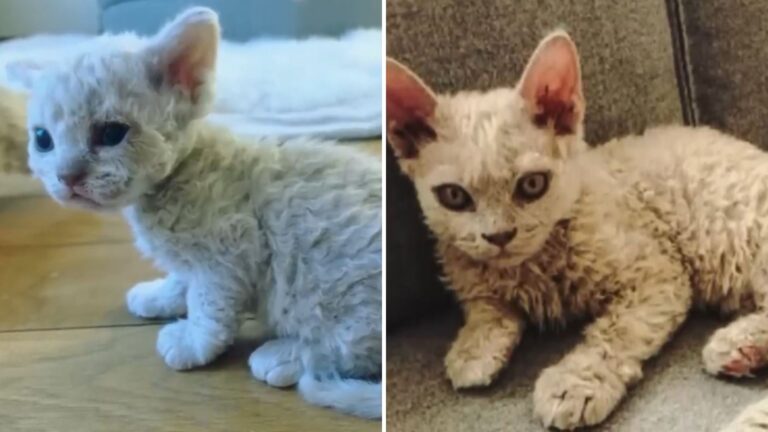Reasons Why My Cats Meow Is Weak And Raspy & How To Help
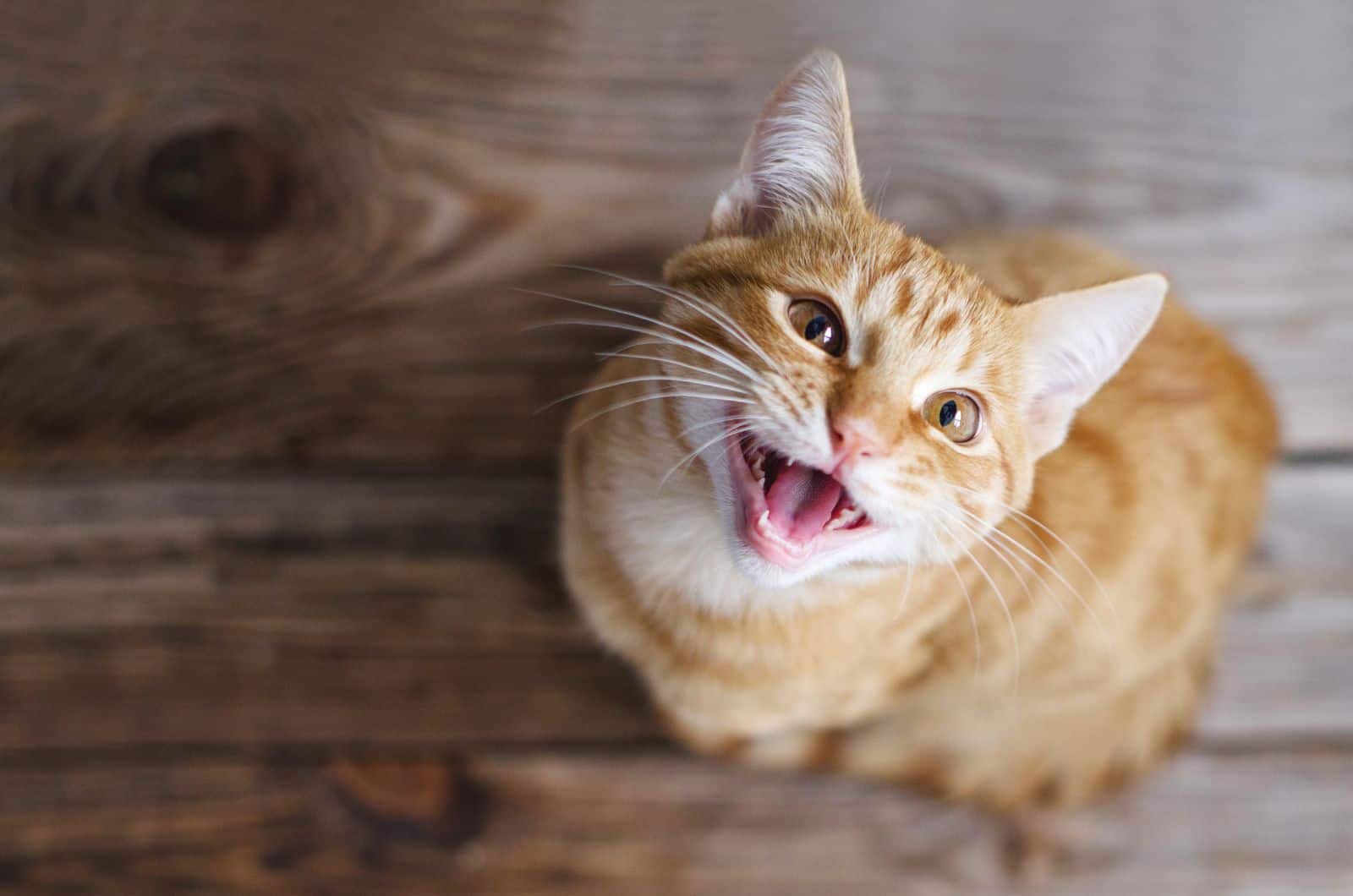
We all know what cats sound like, especially if you own an indoor cat and your day can’t go by without a meow.
Then one day, your cat doesn’t quite sound the same. What is the reason my cats meow is weak and raspy? What could have happened?
There are several things that could be causing your cat’s weak and raspy meow. Whether it’s a new kitten, a three-year-old cat, or a senior, it can happen to any cat.
Your cat may have just overused its voice, it may have caught a cold, or there might be some other underlying illness behind the change.
In any case, you should consult the vet if you notice that your cats meow is weak and raspy.
Here are some most common causes that might be associated with a hoarse voice in cats and some advice on how you can help your cat recover.
My Cats Meow Is Weak And Raspy – Why?
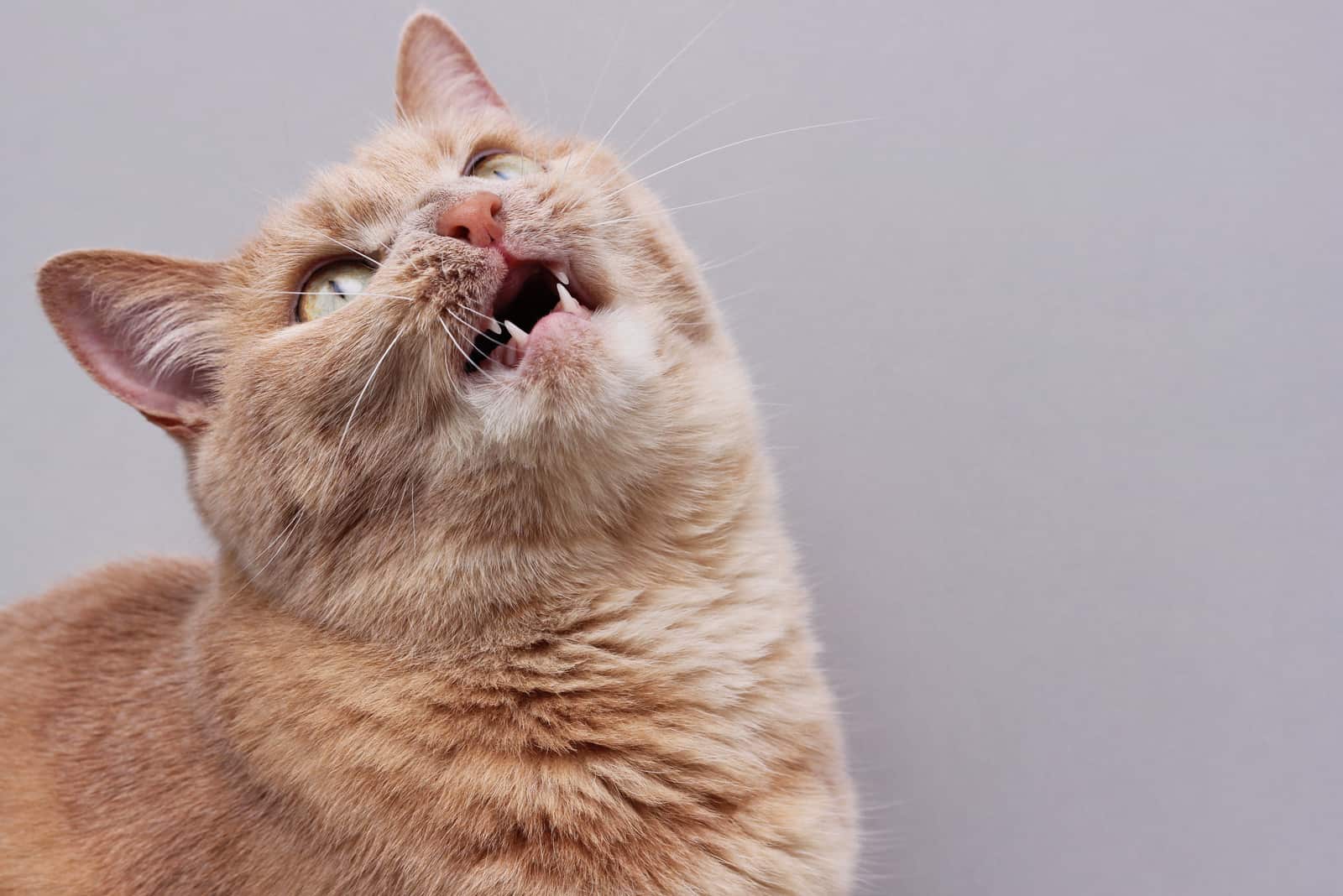
Cats use their meows only to communicate with people; they don’t meow at one another. It is natural to notice anything different about their voice right away and pet owners may be concerned about any unusual changes in their cat’s vocalizations.
A cat’s meow may sound raspy if it has been meowing excessively for a long period of time. They lose their voices just like people may have a hoarse voice after yelling or singing at a loud event.
A cat’s meow may also sound weak and raspy if it has laryngitis or if there’s some kind of infection developing.
The following are the most common causes of your cat’s weak and raspy meows.
1. Laryngitis
Your cat’s larynx has several purposes, including making it possible for your cat to “talk”. Your cat’s ability to meow will diminish if its larynx is injured due to an injury or underlying health condition.
If your cat has laryngitis, it means that its larynx is inflamed due to irritation, sickness, or an obstruction in the throat.
Causes – laryngitis in cats often occurs after the cat has overcome some other illness such as a cold, an upper respiratory infection, calicivirus, or some other disease.
Symptoms – the symptoms of your cat’s laryngitis will depend on the underlying cause, but with the most common causes of laryngitis in cats, symptoms usually include:
• loud breathing
• vocalization changes
• cat lowering its head when standing
• difficulty swallowing
• open mouthed or difficult breathing
• dry cough and bad breath
Again, the symptoms will vary according to the underlying cause of laryngitis. You might notice some other symptoms if your cat happens to have a cold or virus that has caused laryngitis. These might include:
• eye discharge
• runny nose
• appetite loss
• lethargy
If you notice any of these symptoms, you need to visit the vet. Cat laryngitis can be mild and it may well disappear on its own after a couple of days, but it can also be a sign of a more severe underlying cause that needs to be investigated and treated.
Treatment – treatment, much as the symptoms, depends on the underlying cause of laryngitis. A diuretic may be administered if your veterinarian discovers a buildup of fluid in the cat’s larynx.
If your cat is in discomfort, your vet might prescribe a little dose of pain reliever to help your cat feel better. If a foreign body gets stuck in your cat’s throat, surgery may or may not be necessary to remove the obstruction; but all in all, once the object gets removed, your furry friend will sound just as it used to.
If your cat’s hoarse voice is caused by eosinophilic granuloma, it could be treated for parasites, as this illness is frequently triggered by the immune system overreacting to bug stings.
For this condition, corticosteroids might be administered, all according to your cat’s medical records and the vet’s investigations.
Running a humidifier at home, gently wiping your cat’s face, and cleaning any nasal or eye discharge with a soft, moist towel might help your cat feel more comfortable while they heal and recover from laryngitis.
Your vet might also advise you to include some vitamins, nutritional supplements or even a change of cat food to help boost your cat’s immune system.
See also: Your Cat Sounds Congested But No Discharge? All You Need To Know
2. Nasopharyngeal Polyps
Nasopharyngeal polyps are typically benign and are not very common in cats. When they do occur, it is usually in younger cats.
Causes – the exact cause of nasal polyps is still unknown. However, they usually occur alongside upper respiratory infections. There are many studies on the association between polyps and feline calicivirus, or herpes virus, but nothing has been concluded.
Symptoms – the most common symptoms of cats’ nasopharyngeal polyps include eye and nasal discharge, sneezing, and loud, open-mouthed breathing.
Nasal polyps can partially or completely restrict the nasal passageways. If left untreated, nasal polyps can cause major health issues such as recurring respiratory infections.
Any young cat that has recurring sinus infections or breathing abnormalities should be checked for the presence of nasopharyngeal polyps.
Treatment – The suggested therapy is surgical eradication of the polyp growths. The vet will remove the polyp using a procedure known as traction or avulsion, giving anesthesia to your cat while they remove the problematic tissue.
It is critical to remove the polyp’s stem as well to prevent reappearance. It is likely that your vet will prescribe some medications after the surgery to lower the likelihood of polyp recurrence.
3. Upper Respiratory Tract Infection
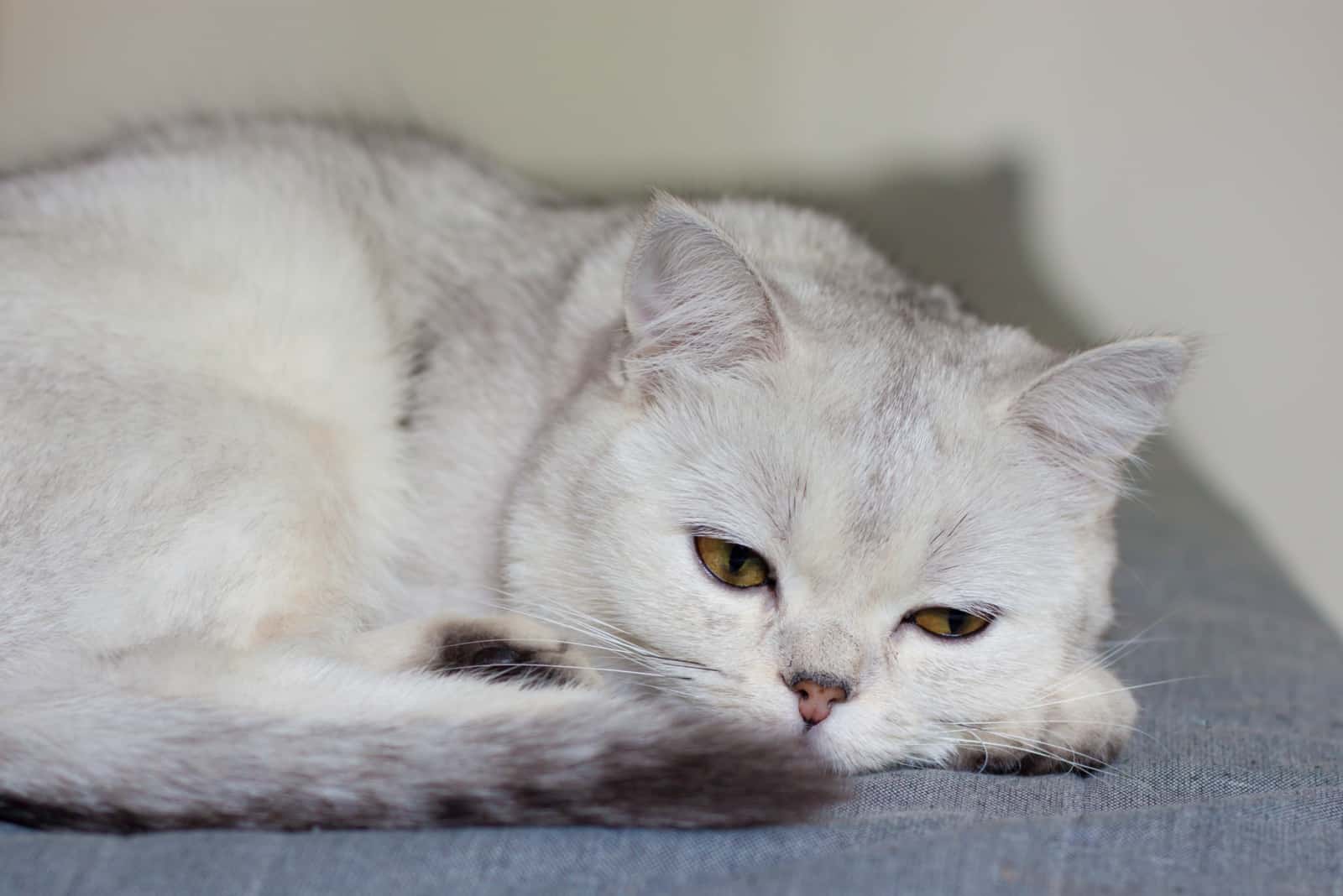
Feline upper respiratory tract infection is quite common. It may appear to be similar to a cat cold, but it is more severe. It is usually caused by viruses and commonly affects the cat’s nose, throat, and sinuses.
Causes – an upper respiratory tract infection in cats is typically caused by viruses but can sometimes be caused by bacteria. The most common causes include feline calicivirus, herpes virus, chlamydia, fungus, or bordetella.
Viruses can be discovered in the secretions of sick cats’. They spread quickly through physical contact, such as petting and grooming, or when cats sneeze at one another.
Viruses can also survive on surfaces cats have been near, such as cat dishes and litter boxes. People who have dirty hands or clothing can transfer particles from one cat to another.
Symptoms – there are numerous symptoms that cats can display when they have an upper respiratory infection; the following are the most common ones.
• Runny nose
• Congestion
• Drooling and sneezing
• Coughing and fever
• Eye and nasal discharge
• Appetite loss
• Ulcers in the mouth and nose
• Lethargy and depression
• Squinting eyes and hoarse voice
Treatment – depending on your cat’s diagnosis, your vet will instruct you on how to care for it. The treatment plan might include diet changes, additional nutrients, medications, fluids and rest.
Antibiotics are sometimes prescribed if a cat develops a secondary bacterial infection. Here is some general advice on how to help your cat to recover;
• Ensure your cat is eating enough food, sometimes cats lose some of their sense of smell when ill. Stir or heat their food to increase the aroma, and provide special treats that have a more intense smell, so your cat will be tempted to eat.
• Provide your cat with a comfy spot and its own privacy, so it is easy to rest and relax.
• Provide air humidifiers, or let your cat rest in the bathroom while you’re showering (the steam will make it easier for the cat to breathe).
• Gently wipe and clean your cat’s face so there’s no discharge irritating it.
• Always use the vitamins or meds your vet prescribes and remember to finish the course even if your cat appears to have recovered.
You might also want to read: Cat Suddenly Lethargic And Weak – Causes & Treatment Options
4. Laryngeal Paralysis
Laryngeal paralysis in cats is a health disorder that occurs in the upper respiratory tract when a cat’s larynx isn’t able to close or open as it should. The muscles that usually do the job of opening and closing of the mouth and which allow your cat to meow, aren’t working properly, and therefore laryngeal paralysis occurs.
Causes – there are a few possible causes of laryngeal paralysis in cats, including:
• Muscle abnormalities
• Idiopathic causes
• Trauma
• Congenital birth condition
• Tumors or abscesses on a cat’s chest or neck
• Nervous system disorders
• Hypothyroidism (rare for cats)
Obesity isn’t a cause, but it can make laryngeal paralysis worse.
Symptoms – Laryngeal paralysis in cats is considered a medical emergency because of the risk that airflow will be stopped. This can swiftly lead to asphyxia and – sadly – to death if not treated in time.
Make sure to contact your vet if you notice any of the symptoms.
Laryngeal paralysis isn’t easily detected at first, but early symptoms might include:
• Lethargy and loss of weight
• Coughing and sore throat
• Raspy voice
• Loud breathing
• Effort to breathe
• Trouble with swallowing
Other symptoms can occur if the condition progresses. Your cat might experience weakness, changes in body temperature, and stress/ anxiety.
Treatment – In the beginning, supportive therapy meds might be administered by your vet to help reduce the inflammation, help your cat rest, and improve its breathing. These therapeutic techniques may be insufficient if the condition worsens and the cat experiences more severe breathing issues.
Any cat experiencing respiratory distress (or difficulty breathing) should be checked by a vet right away.
Surgery is typically required; unilateral arytenoid lateralization is a surgical treatment that includes permanently opening one side of the larynx so that air can flow into the cat’s lungs. This clears the airway and helps your cat breathe more easily.
5. Hyperthyroidism
Hyperthyroidism in cats is usually caused by a benign tumor of the thyroid gland. This tumor creates an excess of the thyroid hormone thyroxine. The main purpose of the thyroid hormone is the regulation of a cat’s metabolism.
Cats with excess thyroid hormone have a considerably higher metabolic rate, causing them to lose weight while still having a hungry appetite. These hormones affect a cat’s body temperature, skin, muscles, nerves, brain, heart rate, and metabolism, causing weight loss.
Causes – the excessive production of thyroid hormones causes hyperthyroidism, however, there are common reasons that cause the thyroid gland’s to go into overproduction, including:
• Cat’s age
• Thyroid cancer (rare)
• Flame-retardant chemicals
Symptoms – you will need to visit the vet in order to get a reliable diagnosis for your cat. You can have a look at the general signs of illness and symptoms that might indicate hyperthyroidism:
• Behavior changes
• Diarrhea and/or vomiting
• Enlarged thyroid gland
• Increased appetite
• Weight loss
• Frequent urination
• Difficult or rapid breathing
• Excessive thirst
• Rapid heart rate
Treatment – your vet will examine your cat and perform any necessary tests, such as bloodwork and x-rays, after which he will make a diagnosis and propose a treatment plan.
You can either do a radioactive iodine treatment, opt for surgery, or take methimazole meds, but all these options are likely to be accompanied by diet changes.
See also: Why Is My Cat Drinking A Lot Of Water And Meowing?
6. Foreign Body Stuck In Cat’s Throat
Cats are generally active creatures that like exploring the environment; they all like to sniff around. It is not uncommon for a foreign body to be breathed in or ingested, getting stuck in the cat’s throat.
Bits of thread and other little objects such as pieces of toys are some of the most typical items that cats mistakenly consume. As well as this, when cats consume their meal too rapidly, even wet food chunks, food particles may become trapped in their throat.
Whatever it is that they ingested, it might obstruct the passage of sound and air, resulting in hoarse meow sounds.
If you notice your cat’s voice changing or becoming hoarse or raspy (why does my cat sound like this?!), you should consider visiting the vet. If something is stuck in your cat’s throat, you need to get it out as soon as possible.
Your veterinarian will be able to determine if something is stuck and whether it is creating a complete or partial blockage. The removal of the item is usually simple, but infection is possible, so monitor your cat and always return to your vet for a check-up exam.
7. Cat’s Voice Overuse
Your cat’s meow might also sound raspy and weak because its voice has been overused. Meowing loudly for extended periods of time can put a lot of stress on a cat’s vocal cords.
Because of this, meowing for a prolonged period of time is quite hard for cats, and so their voice may weaken with time.
Cats only meow to get the attention of people, so if you notice a loss of voice or your cat sounding weak and raspy, this may be a sign they have been trying to get your attention.
A cat’s voice getting hoarse due to overuse is not very likely unless your cat has been very upset, stressed, or trapped, for example.
If your cat has been accidentally stuck somewhere, or you have closed a door not knowing your cat is in the room, your cat will start meowing like crazy because it wants to get out.
Your cat needs to meow long and loud because it cannot open the door, so it needs to meow in order to call you and be freed.
It is important to watch out that things like these don’t happen, so your cat remains healthy, purring and meowing as usual!
See also: Can Cats Breathe Through Their Mouth? Everything You Need To Know!
FAQ
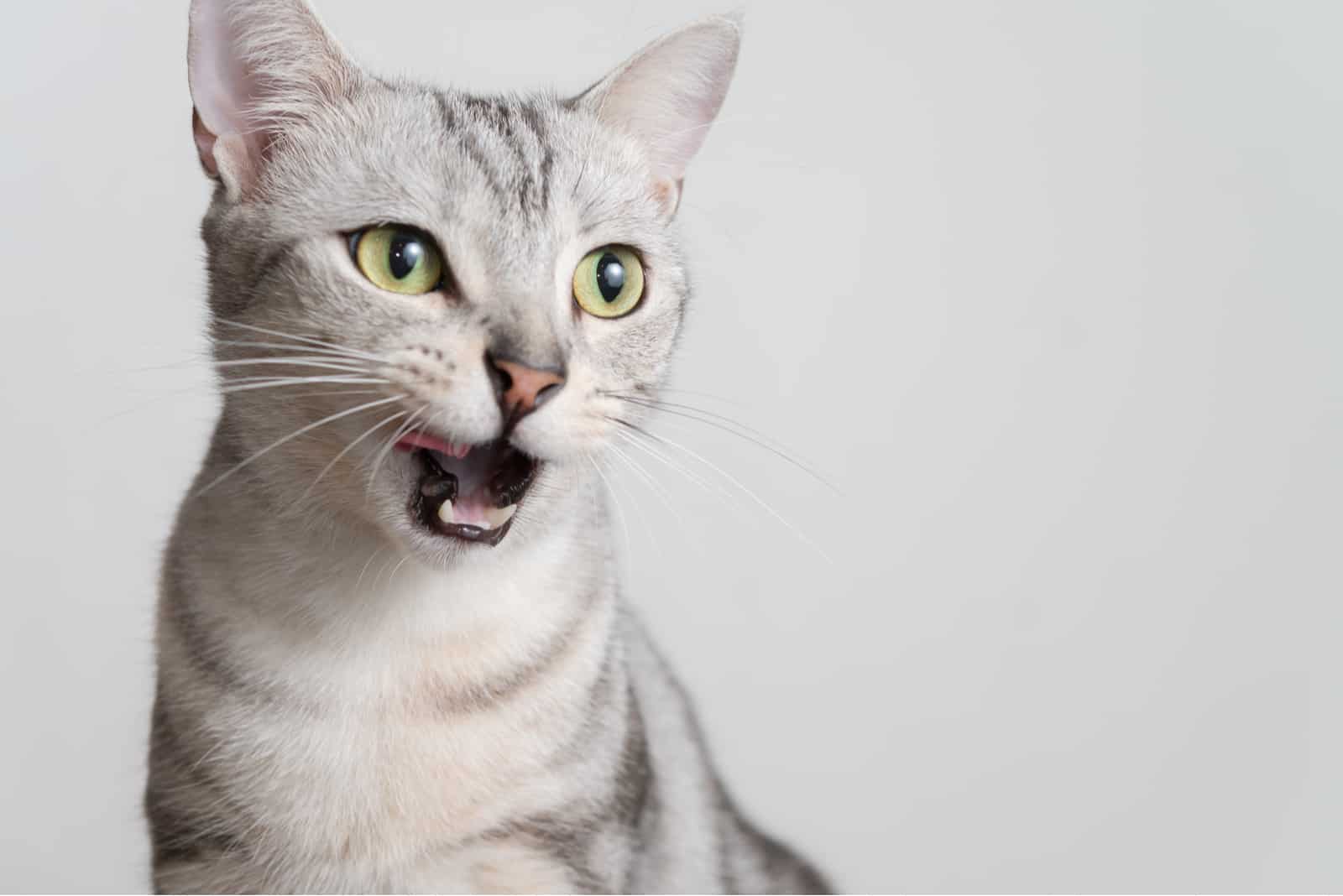
Why did my cat’s meow get raspy?
If your cat’s voice has been overused, its meow may sound harsh and broken. Meowing loudly for a long period of time puts a lot of stress on a cat’s vocal cords. Meowing becomes difficult for cats, and as a result, the intensity of its sound weakens.
Other common causes are laryngitis, hyperthyroidism, laryngeal paralysis, upper respiratory tract infections, nasal polyps, or something stuck in your cat’s throat.
How do I fix my cats hoarse voice?
The first thing you should do is seek veterinary advice. Take your cat to the vet’s clinic, where they will examine your cat and give you a diagnosis; establish the problem and its cause and then put in place a plan for treatment.
Why does my cat’s meow sound like she lost her voice?
The cause of this is usually laryngitis. Laryngitis is an inflammation of the cat’s larynx, and it can make it painful for your cat to meow, which also results in hoarse sounds.
Other causes might include some other inflammation or infections of the upper respiratory tract, polyps, or even a foreign object getting in the way of your cat’s airflow.
No matter what you suspect the cause might be, you need to call the vet if you notice any changes in your cat’s meows.
What can I do to help my cat’s meow sound better?
If your cat’s main problem is weak and raspy meowing, it’s usually nothing serious, and there’s no need to seek emergency medical attention.
If your cat is eating and drinking as usual, and there are no significant changes in its behavior, then there’s no need to worry. You just need to pay close attention to your cat, and if anything else changes, go and see the vet. It’s always best to be safe.
Final Thoughts
We all love to hear that familiar meow or affectionate purr from our pet cats. However, there may be times when your cat’s voice doesn’t sound right. Why does my cat’s meow sound different? What could make it so raspy?
There are several causes for a cat’s weak and raspy meow, and it can happen to a little kitten or a twenty-year-old cat. Your cat might have overused its voice, caught a cold or they may be suffering from some other health issue.
Your cat’s health is a priority, so seek veterinary advice. The vet will find out for sure what’s causing your feline friend to sound raspy and weak. It might be something that will resolve by itself, or it could be something more severe.
In any case, it’s important that you address it and begin the treatment your pet needs.
Listen to your vet’s advice and you won’t have to worry!






